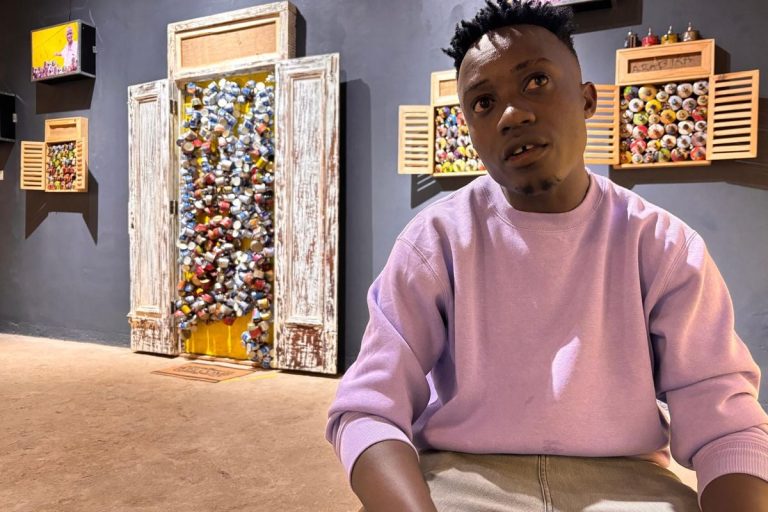Forgotten truths in Kikomeko’s art
Kikomeko’s art does not simply hang on a wall—it grows louder, brighter, and more chaotic the longer you stand before it. In Zikusanze If You Do, Zikusanze If You Don’t, his latest exhibition at Metroplex Shopping Mall in Naalya, co-created with Joseph Wamala Kyeyune, he builds tension piece by piece, using fragments of discarded life: scanned land titles, Blue Band tins, tadobas, wrappers, number plates, and cargo tags. These objects become questions about identity, inheritance, and consumer culture. “We are always carrying something,” he says. “A name, a tag, a border, a history.”
Kikomeko finds his materials in markets, hardware stores, and even his late father’s bakery trays. A photograph of his father with a white man, surrounded by baking tins, became a creative seed. It reminded him how family memories are shaped by what we buy and who we buy from. In his installations, wick lamps, baking trays, and supermarket shelf replicas become tools to interrogate what we consume and why.
Read Also
The Best Herbal Medicines for Common Diseases and How to Grow Them
Ugandan Films on Small Screens
Layers of identity and ownership
“Even a cargo tag has an identity,” Kikomeko points out. “Before it gets to you, it carries someone else’s name, their journey.” In the exhibition, glowing lightboxes—usually tools for advertising—are repurposed to question capitalism, not sell it. His earlier works like The Source and Tracing Identity share the same DNA, using family photos, land deeds, and barcodes to show how ownership and history seep into daily life.
A personal land dispute left a lasting mark, inspiring the recurring red boundary line motif in his work. It appears floating, fragmented, bleeding across surfaces—a visual scar from a fight over maps the family never drew. “That red line caused a fight. We are still at war over maps we never made,” he says.
Art rooted in everyday language
The title Zikusanze was born from a heated land meeting. For Kikomeko and Wamala, this language—gathered from taxi stages, courtrooms, and neighbourly disputes—is the soil from which their art grows. The materials, from tadoba windows to cargo tags, mirror lived experiences and common memories, making the art both relatable and confrontational.
Paired with Wamala’s brushstrokes, Kikomeko’s rustling scrap metal voice shakes the gallery walls. “We are not decorating walls. We are shaking them,” he declares. Hosted by Vodo Arts Lab and Society, the exhibition is less a display than a conversation—between two artists, between materials and meaning, and between the past we inherit and the truths we try not to forget.

